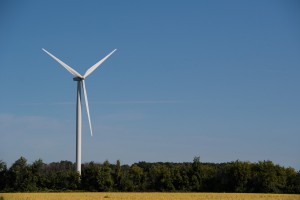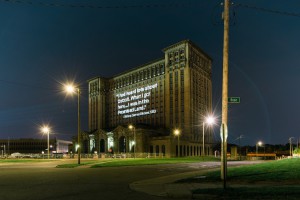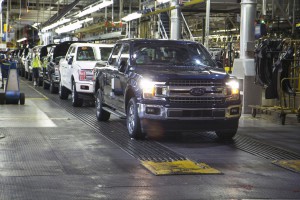
Ford's electricity for its facilities stretching from Dearborn to Detroit will now come from green resources, like this wind turbine.
The smoke and grit from the Ford Motor Co.’s sprawling Rouge complex embodied in Charles Sheeler’s fabled pictures from the 1920s have long been part of the of the Motor City’s lore and heritage.
However, Ford and DTE Energy, a local energy provider, are vowing that key parts of the Rouge as well as other key Ford installations stretching from Dearborn to Detroit’s Corktown neighborhood, including the Michigan Central Train Station that will become a part of the company’s research and engineering campus, will be powered by electricity generated by wind and solar power.
Ford Motor Co.’s Dearborn Truck Plant, the Michigan Assembly Plant in Wayne, Michigan, as well as several new buildings on the Ford Research and Engineering Campus and will soon be powered by 100% locally sourced renewable energy, Ford announced this week.
The use of wind power is in addition to the 500-kilowatt solar photovoltaic panel system already in place at Michigan Assembly, Ford officials noted.
(Ford cutting operations in Brazil; closing oldest plant. Click Here for the story.)
Ford isn’t alone among automakers using a greener approach. General Motors also has become a major use of electricity from wind power, particularly in Texas, and also has developed large solar arrays at plants around the world.
The Dearborn, Michigan-based automaker said it is committed to substantial renewable energy procurement through DTE Energy’s MIGreenPower program, supporting the company’s Southeast Michigan portfolio and providing 500,000 megawatt hours of locally sourced Michigan wind energy.
“Ford supports the implementation of renewable energy where the project can be tied to the customer’s facility, either directly or through the local distribution utility, and we believe that supports local jobs, improves the local environment and adds resiliency to the local grid,” said George Andraos, Ford Global director of Energy and Technology.
Ford also plans to announce a new Global Carbon Reduction Strategy, which will focus on renewable energy in conjunction with the launch of the company’s 20th annual Sustainability Report in June.
(Click Here for more about Ford using bamboo in vehicles.)

Ford's new acquisition, the Michigan Central Station, will use renewable energy when it comes online.
“Ford is proud to be a part of this initiative, as it builds on the early achievement of our aggressive 30 percent per vehicle carbon reduction target,” said Andy Hobbs, director, Environmental Quality Office. “That early achievement reduced the company’s annual footprint by 3.4 million metric tons.”
With MIGreenPower, DTE electric customers can join the company’s efforts to develop more Michigan-made renewable energy by matching their energy use to local wind and solar projects. In January, DTE received approval from the Michigan Public Service Commission (MPSC) to expand its voluntary renewable offerings to include a tariff designed specifically for large corporate and industrial customers.
Ford is the first company to announce involvement with this new tariff.
“Expanding MIGreenPower to help our largest corporate customers meet their sustainability goals is another milestone in our clean energy transformation,” said Trevor F. Lauer, president and COO, DTE Electric.
(To see more about GM being lauded for its commitment to renewable energy, Click Here.)
“It’s exciting that iconic Ford vehicles like the F-150 will be built in a plant powered by DTE wind energy, and we appreciate the leadership role Ford is taking in reducing its carbon footprint and supporting our state’s clean energy economy.”

